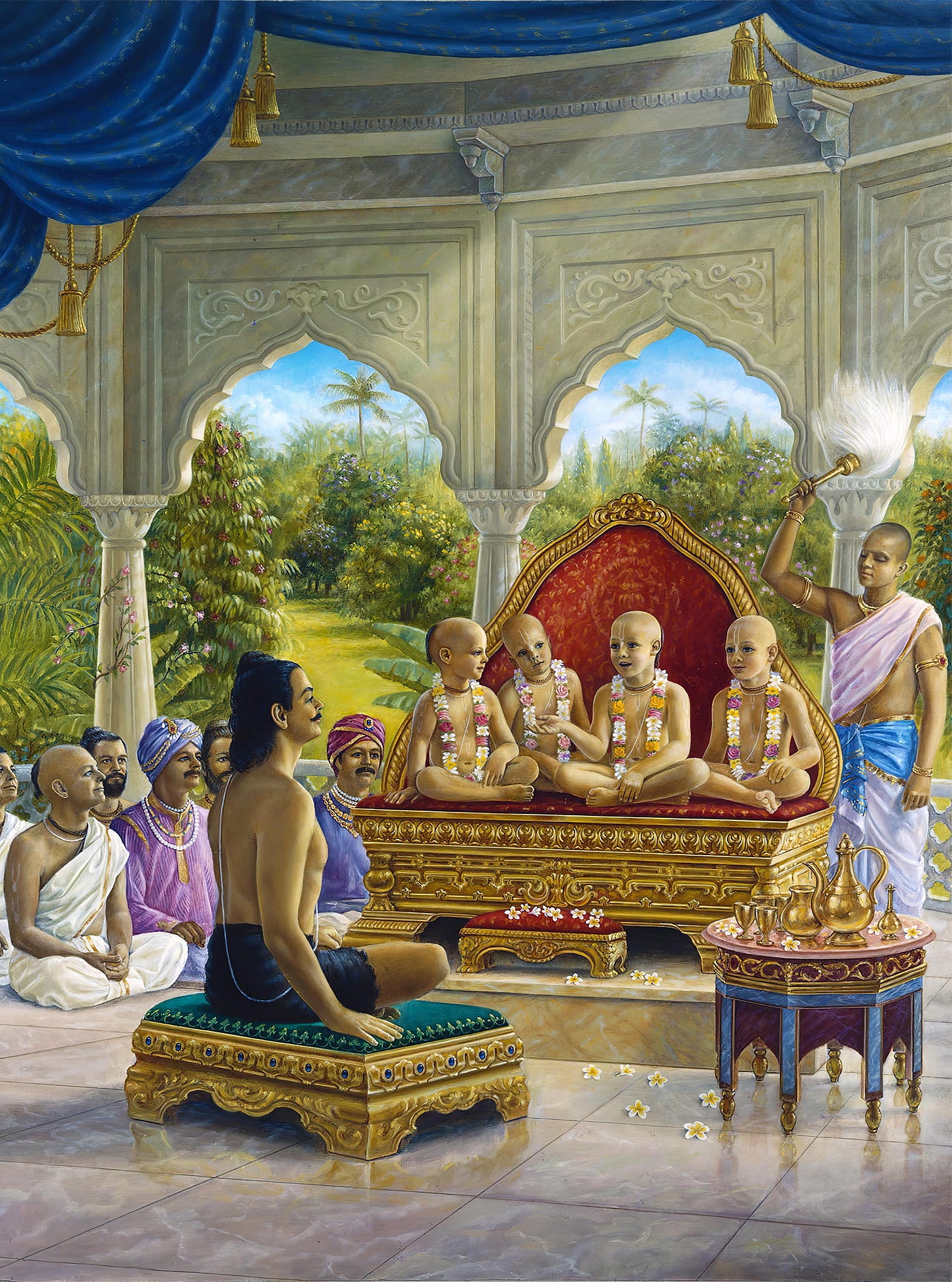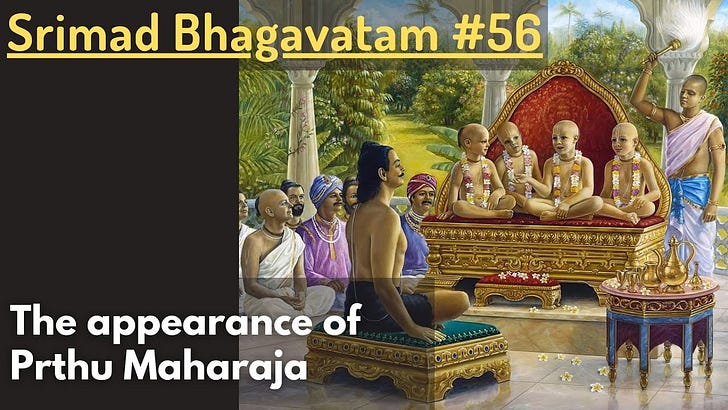Pṛthu Maharaja practices austerities in the forest after ruling the kingdom
Pṛthu Maharaja embodied the ruling power of the Lord, appearing in a time when the performance of sacrifices had been stopped by Vena, who prohibited the Brahmanas from performing sacrifices to Viṣnu.
Pṛthu Maharaja embodied the ruling power of the Lord, appearing in a time when the performance of sacrifices had been stopped by Vena, who prohibited the Brahmanas from performing sacrifices to Viṣnu, declaring that he himself was God.
Not only did Pṛthu Maharaja reestablish sacrifices, but he acted as a perfect king. Just as he gave the perfect example during his life, after becoming old, he accepted the mission of showing how one is supposed to renounce the world and dedicate the last years of his life to achieving spiritual perfection.
It’s described that Pṛthu Maharaja followed the process of austerity while living in the forest as seriously as he had previously engaged in his duties as a king. This shows another example of renunciation. Often, we perform one type of activity jubilantly due to attachment, another morosely due to aversion. This shows we are still under the material duality. In a platform of true renunciation, one can be determined in the performance of one’s duties regardless of them being materially pleasant or not. This is possible when we engage ourselves fully in the service of the Lord. In the beginning of the Gītā, Arjuna wanted to avoid the fight in the name of renunciation, but Krsna explained that true renunciation means to perform one’s duties with a detached mentality, as an offering to the Lord, being them pleasant or unpleasant.
The reason renunciants traditionally retire to the forest is that living in the forest fosters the mode of goodness, while city life stimulates the modes of passion and ignorance. One would then live by eating foods naturally available in the forest, such as roots, tree trunks, fruits, etc., and gradually decrease eating and other bodily demands, preparing to eventually leave for a better destination.
Just like Pṛthu Maharaja, the six Gosvāmīs were also living very simply under trees, but Prabhupada alerts that this lifestyle is not possible for most nowadays. As he alerts, many go to Vṛndāvana and try to imitate, but most end up falling into sinful habits such as illicit sex and intoxication even while living in Vṛndāvana. Instead, he suggested that devotees seriously interested in a life of renunciation should take shelter of a temple, chant, and eat only prasādam.
Living in a temple is better than living in the forest, since a temple is an embassy of the spiritual world, as good as Vaikuṇṭha. Just as a national harassed while living in a foreign state can take shelter of the embassy of his own country there, a devotee living in the material world can take shelter of a temple of the Lord and live in a transcendental atmosphere. This is one of the facilities offered by a spiritual society, and a better option for devotees who desire to retire from material life than going to the forest.
Why was Pṛthu Maharaja performing such rigorous austerities? He had only one purpose: The satisfaction of Krsna. The process he was following was the appropriate process of renouncing life for the time he was living, and he was performing it perfectly, giving the proper example for ordinary people. In the age we live, however, the process for self-realization is different: to chant the holy names, hear the Srimad Bhagavatam, worship the Lord, accept His prasādam, follow the regulative principles, and, in the case of renunciants, live in a temple or other sacred place. We should not try to imitate the austerities of Pṛthu Maharaja, but we can follow his example of determination.
The austerities of Pṛthu Maharaja were not just a show or mechanical performance. His goal with this process was to increase his devotion to the Lord, and he practiced according to the instructions he had received from the Four Kumāras.
As a result, he quickly became situated in the transcendental stage, free from the bondage of the false ego, completely free from material contamination. In this pure platform, he could practice his devotional service unhindered.
By his advancement in devotional service, a devotee automatically becomes detached from his material body and everything else that is material, just as one who embarks on a plane automatically leaves the ground as soon as the airplane takes off, without a separate effort. At first, a devotee becomes detached from the material body, and then from the false ego itself. After this platform of liberation, one’s spiritual body, spiritual mind, and spiritual intelligence begin to manifest, and as they manifest, one begins one’s activities in transcendental life. All these are part of the soul and eternally present, but they become covered due to the association with matter. When this association is broken and one again identifies with one’s eternal spiritual identity, they automatically manifest.
Because the process of bhakti is higher than karma, jñāna, and yoga, it offers all the results of the lower processes. In his Nārada-pañcarātra, Nārada Muni compares the process of devotional service to a queen. When the queen gives an audience, many maidservants follow her. Similarly, devotional service is followed by the maidservants of material opulence, liberation, and mystic powers. A pure devotee is thus not deprived of the results of the other processes, but because he attains a higher taste, he is not interested in these material opulences. As Śrīla Bilvamaṅgala Ṭhākura prays in his Kṛṣṇa-karṇāmṛta (11): “My dear Lord, if I have unflinching devotion to You, You become manifest before me personally, and the results of fruitive activity and empiric philosophical speculation — namely religion, economic development, sense gratification and liberation — become like personal attendants and remain standing before me as if awaiting my order.”
Read also:
The appearance of Pṛthu Maharaja (Srimad Bhagavatam #56)
By killing Vena, the Brāhmaṇas stopped his policy of suppressing sacrifices and the worship of the Supreme Lord. However, this led to another problem, which was the rise of thieves and criminals who started plundering the citizens unopposed. It is described that the running of all these thieves formed dust storms around the kingdom, suggesting they had organized themselves in large hordes and were systematically plundering and killing. The save the citizens, the Lord appeared as Pṛthu Maharaja.




Hari bol.....
Hare Krishna prabhu, thank you for this article. Your recommendation of living in the temple instead of the forest is troublesome to me. In the Temple you may find that there are politics within management and also day to day problems of runninng the place. Also the worst part is the constant influx of karmi visitors and women who can take our attention away from our Sadhana. In the forest there is minimal need to interact with other humans so I think it is better place to do our sadhana/bhakti yoga.